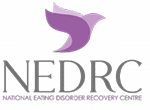National Eating Disorders Recovery Centre
First in Eating Disorders
Eating Disorders Recovery Virtual Day Programme
The Coronavirus (COVID-19) situation in Ireland is changing daily, but supporting people with eating disorders remains our top priority.

“They may forget your name, but they will never forget how you made them feel”
Families are an important part of the recovery process and we encourage their participation but only with your consent. We also understand that not everyone has a relationship with their family and would not force this connection.
About Us
The National Eating Disorders Recovery Centre (NEDRC) supports a realistic view to health and weight. We incorporate WHO, NICE, MARSIPAN and the HSE Model of Care for Eating Disorders guidelines along with elements of Health at Every Size (HAES) principles, Intuitive Eating and Therapeutic Movement. We approach each individual with a holistic view, using the Medical, Therapeutic, Psychosocial and Recovery models.

Our Therapy Programme incorporates
CBT ED- Cognitive Behavioural Therapy Eating Disorders, concentrates on patterns of abnormal (unhelpful) thinking patterns and distorted beliefs that are the underlying causes for irrational emotions and thought patterns. NEDRC staff have trained in CBT- E which incorporates CBT and adapts skills towards a person with an Eating Disorder.
DBT- Dialectical Behavioural Therapy, provides people with the skills to manage painful emotions and decrease conflict in relationships. It provides the skills to regulate emotions, feel less vulnerable, develop assertiveness and distress tolerance.
RO DBT (Radically Openness DBT), incorporates DBT but focuses on individuals who suffer from emotional and behavioural over-control and is beneficial for people with chronic depression or anorexia, also ASD (Autism Spectrum Disorders), OCD (Obsessive Compulsive Disorder) and Personality Disorders.
Decider Skills, is particularly beneficial for adolescents and young adults. It is more of a practical, skill-based therapy which equip the individual with the tools to recognise their own thoughts, feelings and behaviours and enables them to mange their own emotions and mental health.
ACT (Acceptance and Commitment Therapy), aims to increase an individual’s ability to be flexible in the way they think so they are better able to adapt to life situations and live a full and meaningful life.
EMDR (Eye Movement Desensitization and Reprocessing therapy), recommended and endorsed by the WHO & NICE. A significant number of individuals with an Eating Disorder have suffered some form of Trauma in their life. EMDR enable clients to recall memories but without the same level of distress
MB-EAT (Mindfulness-Based Eating Awareness Training), through mindfulness eating practices the individual learns to listen to what their body really needs and why, how to experience the pleasure of food without guilt or over-eating, emotional eating and disordered eating patterns.
SSCM (Special Supportive Clinical Management), is an incorporation of IPT & CBT and has been found to be particularly beneficial for individuals with long standing Anorexia. The focus is not just on symptoms but also on quality of life and improvement of same.
IPT (Interpersonal Therapy), is particularly beneficial for people with Bulimia, Binge Eating and Depression. It is a structured therapy with the main principals of the therapy being how you relate to others and how this impacts your emotional and mental health.
MANTRA (Maudsley Model of Anorexia Nervosa Treatment for Adults), aims to address the Cognitive, Emotional, Relational and Biological factors which are keeping the person “stuck” in their Anorexia. Can be beneficial for clients who report rigid thinking, low motivation or ambivalence to recovery
FBT (Family based Treatment) is a treatment approach that places parents at the centre of their adolescent’s treatment. Phase one involves empowering parents to temporarily assume responsibility for all food and eating-related decisions in order to facilitate the adolescent’s weight restoration. In phase two, families support the adolescent to resume responsibility for their food choices and maintain a healthy weight. In phase three, families help the young person return to their normal developmental path, which may have been disrupted by their illness.
(CFT) Compassion Focused Therapy, addresses shame and/ or self-criticism which can be very real issues for someone with an Eating Disorder. CFT encourages Social Connectedness and self-compassion to help clients deal with distressing feelings rather than using self-destructive behaviours.
Start your recovery journey today
Give us a call to schedule an appointment.
Phone: 01 564 4450 / 087 7755996




